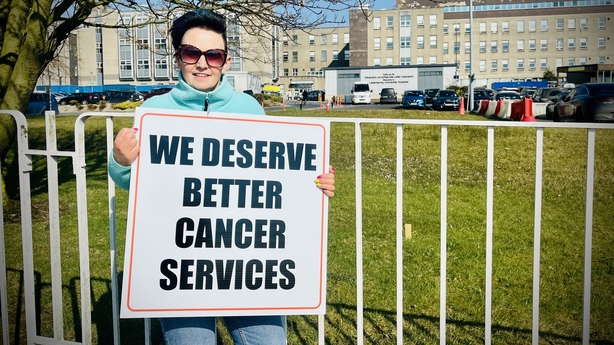A protest outside Letterkenny University Hospital (LUH) has heard calls for improved cancer care facilities in the north west.
Figures provided at a recent Regional Health Forum West meeting showed three in 10 cancer patients start treatment within the target timelines at LUH.
Approximately 31% of cancer patients receive chemotherapy within the recommended 15 days at LUH, compared to 62% of patients at Galway University Hospital, 78% of patients at Sligo University Hospital and 100% of patients at Mayo University Hospital.
The National Cancer Control Programme states that cancer patients receiving a new parenteral systemic therapy in the day ward setting should not have to wait longer than 15 days for treatment to begin from the time they are deemed ready for treatment.
A target of at least 90% compliance has been set for all hospitals under the National Cancer Control Programme.
Cancer survivor Roseena Doherty receives ongoing care in Letterkenny.
The mother-of-five from Clonmany in Inishowen said that while hospital staff are "absolutely amazing", she believes LUH does not have the facilities needed to accommodate the area.
Mrs Doherty, who was diagnosed with Acute Myeloid Leukaemia in 2021, said LUH needs a standalone cancer unit.
"They talk in Government about a Centre of Excellence in Galway accommodating the west and the north west," she said.
"If you live anywhere in Donegal - it's such a long way from Galway. They [the Government] don't seem to understand it.
"I have travelled to Dublin [for treatment] and I had to stop to get sick on the road. That's the joys of being a cancer patient [from Donegal]."

Mrs Doherty said people should not have to travel when there is a hospital nearby and she called for "proper cancer facilities" around the country.
"They talk about one in two people will get cancer and that five out of seven will survive that cancer - a survivor still needs care," she said.
"I still need care and I'm two years in remission. I don't know when I will not need care because my immune system has been torn to pieces."
A HSE spokesperson said that in terms of Systemic Anti-Cancer Treatment (SACT), activity in all units is "challenged" because of an increase in demand.
"Increase in demand is multifactorial other than the predicted doubling of cancer incidence," the spokesperson added.
Some of the factors listed by the HSE include new drug approvals, development of immunotherapy and cellular therapies (CAR-T) and associated complexities, increased tolerability of new drugs, longer and often indefinitely treatment cycles and increased duration and complexity of infusion times.
It said there are increased survival rates due to more effective treatments leading to increased requirement for more lines of subsequent treatment when cancer returns or progresses.
It added that patient survival has improved, but this is associated with significant increase in demand for cancer services, particularly in the day wards.
"In order to address these challenges as effectively and as timely as possible, LUH have established a working group comprised of the members of the Cancer MCAN management team and hospital clinical and management teams," said the HSE spokesperson, adding that they have "commenced measures to improve chemotherapy start times with the objective of returning performance to KPI targets within the shortest possible timeline".
The spokesperson said: "LUH has an area within the inpatient ward which has been designated as a Day Unit extension where patients can have their SACT treatment and will provide some immediate improvement in SACT start times."







